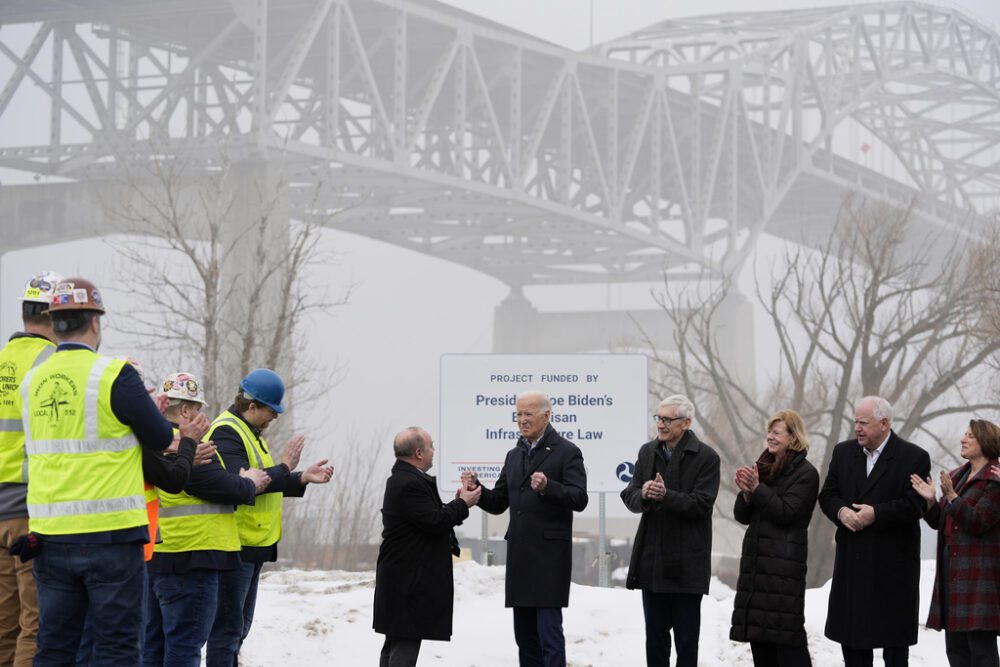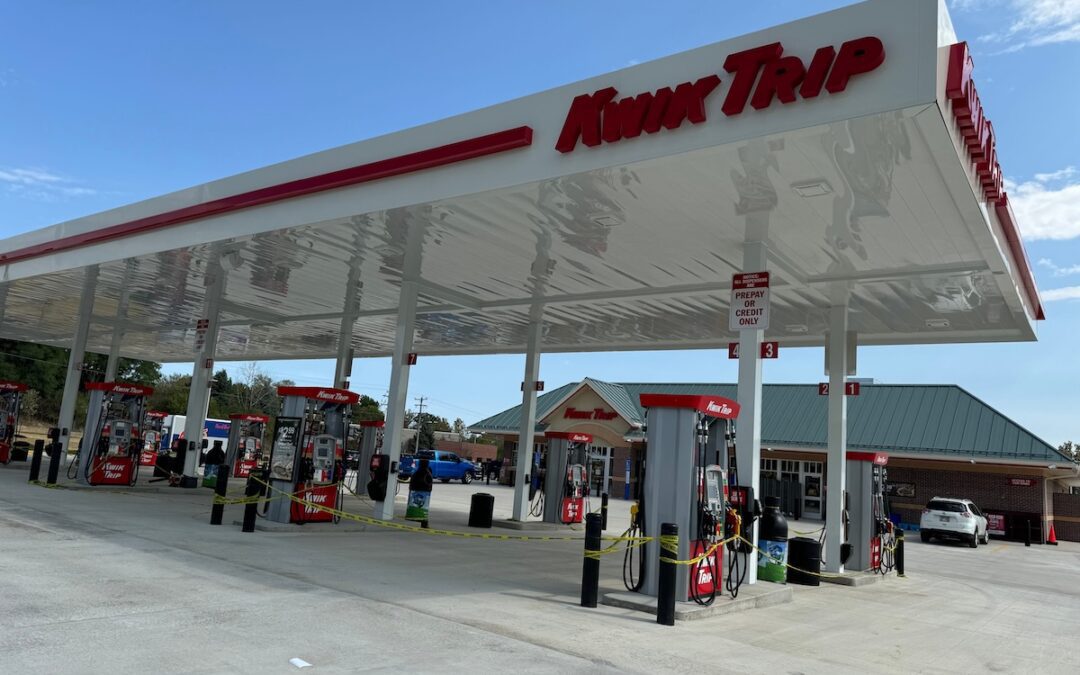
President Joe Biden speaks near the Superior end of the John A. Blatnik Bridge connecting with Duluth, Minn, Jan. 25, 2024, joined by Gov. Tony Evers, Sen. Tammy Baldwin, Minnesota Gov. Tim Walz, and Minnesota Sen. Amy Klobuchar. Biden announced $5 billion in federal funding for upgrading the Blatnik Bridge and for other infrastructure projects. (AP Photo/Alex Brandon)
In this op-ed, Bridget Glover, a union activist within USW (Local 2-232), reflects on the support from the Biden-Harris administration and the impacts infrastructure investments have had on union workers and the Wisconsin workforce.
This week, Vice President Kamala Harris returned to Milwaukee, marking her fourth visit to our state this year. Her administration’s support for unions has been especially significant to me, and witnessing her historic impact as the first Black woman to be the Vice President of our country, I am reminded of the importance of diversity and inclusion in the workforce.
As an openly gay Black woman, finding acceptance within my family and community was difficult. However, over time, they embraced and supported me, prioritizing my happiness and well-being. This journey of acceptance mirrors the broader struggle for inclusivity and support within our society, particularly in the workforce, emphasizing the weight of what it means to invest in union workers and the larger workforce.
In 2021, the Biden-Harris administration passed the Bipartisan Infrastructure Law – a once-in-a-generation investment in our nation’s infrastructure. This historic bill is helping rebuild America’s roads, bridges and rails, generating over 772,000 jobs per year, according to estimates. It is pivotal to know that the majority of these new jobs will be held accountable to federal rules securing higher wages, better working conditions, and strengthening local unions. Not only is this piece of legislation transforming our nation’s infrastructure, but our workforce too.
Growing up, my father was involved in a union, but due to employers’ discouraging union membership, he didn’t stay in it for long — yet his experience influenced me deeply. Nine years ago marked my first experience in a union environment and I’ve never looked back.
I specialize in machine operation as a setup operator within the milling department. My work day begins at six in the morning and ends around two in the afternoon. Within less than a year, I progressed from an entry-level position to that of a lieutenant, with the next milestone being the attainment of a journeywoman card. I call myself a journeywoman instead of a journeyman because I’m a woman of steel, and I’m proud of that.
Our focus is crafting keys from actual metal for automotive brands like GM, Chrysler, Ford, and Tesla, which demonstrates the importance of our work within the manufacturing sector. My experience in my union has been marked by growth and opportunity, culminating in my current role as a member of the Women of Steel group and a United Steelworkers (USW) Next Gen coordinator, helping train the next generation of union workers and labor activists.
I’ve also been involved with my union’s work in the community. Last year, I spearheaded a successful back-to-school drive through the union, marking my first significant community initiative. This experience highlighted the impactful community work facilitated by our district union.
The support from the Biden-Harris administration for unions is crucial, particularly in states like Wisconsin, where anti-worker state-level policies influence our labor conditions, rights, and wages. Through the Bipartisan Infrastructure bill, the Biden-Harris administration advocates for policies that benefit unions and their members, fostering an environment where unions can actually thrive and take up space in historic anti-union states.
Investments in infrastructure and manufacturing not only create jobs, but also prioritize the development and evolution of our industry, providing opportunities for the younger generation in the trades through apprenticeship programs and investing in the well-being of communities of color and low-income people.
In Wisconsin, we have received significant investments for municipally divested communities, including $811.8 million to improve water infrastructure and $129.5 million to replace toxic lead pipes. This will drastically improve our ways of living, health, and economy for decades.
The Biden administration’s commitment to supporting the middle- and working-class by investing in infrastructure aligns closely with the values and needs of union workers. Additionally, this infrastructure bill benefits non-union members, because when unions have support, everyone in the workforce benefits, granting non-union members the opportunity to obtain higher living wages and better working conditions. As someone who has experienced economic hardship first-hand, I believe in the importance of leadership that prioritizes the well-being of all working people.
Investing in infrastructure, backing unions, and implementing diversity and inclusivity within our industries builds a stronger, more resilient workforce and country that truly prioritizes providing opportunities for all its citizens to thrive. We must realize that progressive economic policies that support working people ensure a brighter future for all for generations to come.

Which Wisconsin companies are the best to work for? 4imprint ranks in Forbes’ top 75 list
Wondering which are the best Wisconsin companies to work for? Forbes surveyed employees to find out. Looking for a new job? The hunt for employment...

Tips to help manage your buy now, pay later loans
Between rising prices and dwindling job growth, using “buy now, pay later” on everything from concert tickets to fast food deliveries is becoming...

Uber or Park? How to answer the great travel debate in Wisconsin
When planning your next trip, it’s common to focus on three main expenses: airfare, hotels, and meals. However, there’s one often sneaky expense...

‘Some people work their butts off and other people get rich’: Gwen Frisbie-Fulton’s view from rural America
Growing up, my dad only made two rules for me outside of my chores. The first one was that I wasn’t allowed to make soap with lye. Glycerine soap,...




